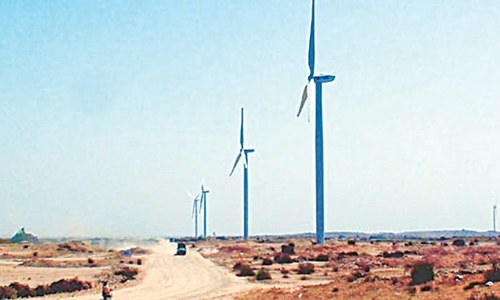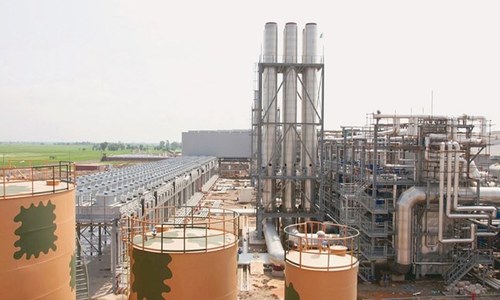With more than half of the country’s total capacity charges payable to state-owned power projects, the government has decided in principle to cut the return on equity (ROE) for all public-sector plants, including hydro, nuclear, old thermal and new regasified liquefied natural gas (RLNG)-based projects.
The combined impact of the reduction in ROE for these projects has been estimated to be Rs28 billion per annum based on current prices. While this will reduce the overall electricity prices with a significant contribution to the economy and lower production costs, a major chunk of the financial burden will shift to the federal budget.
For example, the reduction in ROE form 15-17 per cent to the proposed 10pc in rupee (instead of the dollar at present) will impact Wapda’s revenue by Rs16bn per annum at a time when it is executing some of the most critical development initiatives like Diamer-Bhasha Dam, Mohmand Dam and Dasu Hydropower project. Wapda has also highlighted key problem areas, including debt servicing, upcoming megaprojects and net hydropower profit.
On the other hand, Wapda’s receivables of over Rs210bn are stuck in the circular debt. So it will be hit on two fronts — the future revenue stream and adjustments against past receivables. To make up for Wapda’s loss and protect critical projects, the government will have to make available at least Rs160bn over the next 10 years out of the federal budget, most probably through the Public Sector Development Programme (PSDP).
To make up for Wapda’s loss and protect its critical projects, the government will have to make available at least Rs160bn over the next 10 years
Almost similar is the case with nuclear power plants (NPP) run by the Pakistan Atomic Energy Commission (PAEC), government-owned RLNG power projects and, to some extent, old public-sector generation companies (Gencos). This also means that the federal government will have to sacrifice a major part of its guaranteed revenue on account of its equity share and dividend.
The top management of PAEC has not given its final commitment because of the anticipated financial loss. But the civilian authorities are operating through proper channels to ensure that the build-up of the circular debt is slowed down given the increasing share of NPPs. The PAEC is looking after all matters relating to the existing and under-construction NPPs. The per-unit capacity charge of existing NPPs is more than Rs3.40 and will almost be double for upcoming NPPs of 1,100 megawatts each.
The reduction in ROE to 10pc for Gencos will save about Rs3.5bn per annum. ROE for NPPs may come down to about 14-15pc at a fixed exchange rate of Rs148 per dollar (in line with MOUs signed with private-sector entities) for existing plants with the reduction in electricity cost of Rs2.1bn.
Also, LNG-based GPPs’ return on equity is being brought down to 12pc with the annual cost reduction of about Rs7bn a year. The current outstanding receivables of nuclear plants stand at Rs60bn, followed by Rs50bn of Gencos and Rs40bn of LNG-GPPs. Meanwhile, about Gencos of 2,900MW will be closed down in two phases in two years.
Coupled with the reduction in ROE, doing away with the guaranteed 66pc “take-or-pay” condition for gas supplies will have an adverse impact on proposed privatisation proceeds. But it will be worthwhile to consider the lasting implications of locking such guarantees into long-term contracts with the private sector rather than the short-term objective of higher proceeds.
The move is part of the effort to contain the pace of increase in the circular debt and the consumer tariff given the subdued energy demand following the economic slowdown over the past two years. The circular debt as of June 30 was Rs2.15 trillion against Rs1.612tr a year earlier, an increase of Rs538bn or Rs45bn per month. The increase in the circular debt in 2018-19 was Rs465bn. Put together, the two fiscal years added more than a trillion rupees to the power sector debt.
Also, the authorities are looking into options to change the terms of gas and power off-take contracts of three RLNG-based power plants to reduce liabilities before long-term contracts with private investors are locked in through privatisation. Simultaneously, a request is pending with the Chinese authorities for extension in the debt repayment period from 10 years at present to 20 years and a markup reduction to Libor plus 2pc instead of Libor plus 4.5pc at present.
Under existing arrangements, almost half (Rs550bn) of the more than Rs1tr capacity payments due in 2021 belongs to the public sector. This includes projects under the China-Pakistan Economic Corridor (CPEC) with Rs180bn, Wapda’s old plants (Rs110bn), new Wapda projects (Rs170bn) and LNG projects (Rs100bn).
The total public-sector CPP is estimated to go beyond Rs700bn in 2022 and almost Rs850bn in 2023 against the total CPP of Rs1.5tr in 2022 because of the materialisation of CPEC and NPPs. It is estimated that capacity payments of all NPPs will increase from Rs90bn in 2020-21 to Rs280bn in 2021-22 and beyond for a few years owing to the initial debt cost payable.
The CPP of CPEC projects is estimated to increase from less than Rs200bn in 2021 to Rs350bn a year later under existing circumstances.
Based on the finalisation of fresh arrangements followed by necessary government approvals, the relevant ministries will ask Wapda, PAEC and managements and boards of GPPs and Gencos to file petitions with the National Electric Power Regulatory Authority for revised ROE-based tariff approvals.
Published in Dawn, The Business and Finance Weekly, September 14th, 2020













































